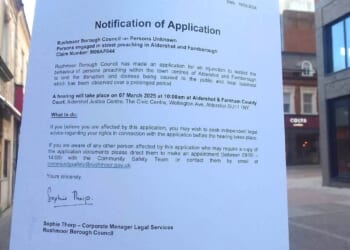Jason Reed is a policy analyst and political commentator for a wide range of media outlets around the world.
Britain is plagued by rogue NGOs.
Since the turn of the millennium, successive governments have signed away vast policymaking power to NGOs and their pernicious cousin, the ‘quasi-NGOs’ which act as regulators (better known as quangos)
Unaccountable bureaucrats should not be governing Britain. Many quangos campaign against the governments which create them. Most consistently propose new policies which involve more regulations, more red tape, and more restrictions on personal freedoms and economic growth. And all gobble up taxpayer money.
The Labour government wants to put an end to Britain’s ‘quango-cracy.’ Pat McFadden, the Cabinet Office minister quietly acting as Keir Starmer’s right-hand-man at the heart of government, has made it his mission to cull unnecessary public bodies. That would save a pile of taxpayer money and, crucially, put the power of governance back in ministers’ hands, where it should be.
But NGOs will not surrender lightly. Does McFadden have the mettle for the fight?
Britain’s “government by NGO” problem is fast spiralling out of control. Power has gone to bureaucrats’ heads. Even as Starmer pushes through his planning reform bill to empower the ‘builders’ over the ‘blockers,’ a group of 32 NGOs is complaining that the bill undermines their power to stop new buildings at will. Green NGOs want the government to introduce yet more statutory requirements to force anyone wanting to build or invest in Britain to seek the permission of their motley crew of eco-campaigners first.
This perverse approach to planning is part of a wider problem. There are more than 170,000 charities in Britain with a collective annual income of £96 billion. (For context, the Ministry of Defence cost £53.9 billion in the same period.) NGOs in Britain seem to believe they have the right to use their vast resources to govern, even when they are at loggerheads with the government.
From Oxfam campaigning for tax rises to Sport England weighing in on planning decisions, NGOs consistently go beyond their remit. Whatever one thinks of government policy, we ought to live in a democracy where it is the government themselves making the decisions. These NGOs are faceless and unaccountable.
Labour’s biggest quango scalp so far is NHS England, whose abolition last month was long overdue. The NHS is world-leading in bureaucracy (though sadly not healthcare) so scrapping the cabal of managers who spend more than 10 per cent of GDP every year and moving NHS management back into the Department of Health was an encouraging sign for the war on quangos.
However, at the same time, the government is unnecessarily creating huge new quangos like Great British Energy and Great British Railways, which will no doubt hoard policymaking authority in the coming years, as quangos consistently do. It is also failing to enforce any changes at all – never mind abolition – on other quangos, even those it has direct clashes with such as the Sentencing Council and the Office for Budget Responsibility.
It’s no use scrapping one quango if two more pop up in its place. On energy and railways, the government should make its own decisions in-house, without outsourcing government to arms-length bodies. And where those bodies already exist, such as on sentencing and the OBR, ministers should rein in their power. Reports suggest the government understands the problems with the current quango-cratic model and feels frustrated, but its inaction indicates it is reluctant to do much about it.
If the government intends to abolish quangos one by one as it did with NHS England, it risks maximum pain for minimum gain. The third sector has become so bloated that a government of genuine reforming zeal would be better off culling its funding in one fell swoop, perhaps by half, to separate the wheat from the chaff at speed. Unfortunately, this approach does not tally with Starmer’s lawyerly, forensic view of government.
Helpfully, on either side of Britain are perfect examples of what not to do. In the US, Elon Musk’s ‘department of government efficiency’ is achieving many useful cuts to the enormous federal government machine, but in such a haphazard manner that it risks throwing the baby out with the bathwater. Meanwhile, in the EU, there is enough red tape to fill the ocean. Every policy proposal – ironically, even those designed to deregulate and simplify government – is required to go through endless rounds of consultations and revisions. There is a happy medium between these two extremes for the British government to find.
The government has made economic growth its core mission, but its overly cautious approach means its actions are unlikely to bring notable growth this side of the Rapture, never mind the next general election. Starmer and McFadden should listen to pro-growth MPs and new non-partisan movements like Looking for Growth which offer a practical roadmap to slimming down the state.
Ending ‘government by NGO’ is not a case of Liz Truss-style unfunded spending. It is quite the opposite. By stripping away parts of the state which don’t need to be there, Starmer will find more money in his pocket for public services and, crucially, pave the way for growth by paring back the mess of NGO stakeholders who currently have a say over policymaking.
That will invite investment and innovation and remove unelected bureaucrats from political power.


![NYC Tourist Helicopter Falls into Hudson River, Siemens Executive and Family Among Those Killed [WATCH]](https://www.right2024.com/wp-content/uploads/2025/04/NYC-Tourist-Helicopter-Falls-into-Hudson-River-Siemens-Executive-and-350x250.jpg)






![Red Sox Fan Makes the ‘Catch of the Day’ with Unconventional ‘Glove’ [WATCH]](https://www.right2024.com/wp-content/uploads/2025/04/Red-Sox-Fan-Makes-the-‘Catch-of-the-Day-with-350x250.jpg)
![Green Day’s Cringe Trump Diss Ends in Fire and Evacuation [WATCH]](https://www.right2024.com/wp-content/uploads/2025/04/Green-Days-Cringe-Trump-Diss-Ends-in-Fire-and-Evacuation-350x250.jpg)






